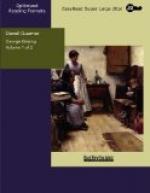He drank a good deal of wine, and talking with a spontaneity beyond the ordinary Briton. Towards the close of dinner his theme was the coming electoral contest.
“You know,” he said, bending over the table, “you will be able to give me important help. The wife of a candidate—especially of a Radical candidate—can find plenty of work, if she knows how to go about it. As little humbug as possible; and as little loss of self-respect, but we shall have to shake a good many dirty hands. Your turn for ‘slumming’ will serve us well, but I know the dangers of it. You’ll be coming home eploree, as they say here. I hope you’ll grow stronger in that respect. One has to harden one’s heart a little.”
“I know it is wiser to do so.”
“Of course! It’s not only that you are constantly imposed upon; the indulgence of universal sympathy is incompatible with duty to one’s self—unless you become at once a sister of mercy. One is bound, in common sense, to close eyes and ears against all but a trifling fraction of human misery. Why, look, we sit here, and laugh and talk and enjoy ourselves; yet at this instant what horrors are being enacted in every part of the world! Men are perishing by every conceivable form of cruelty and natural anguish. Sailors are gurgling out their life in sea-storms; soldiers are agonizing on battle-fields; men, women, and children are being burnt, boiled, hacked, squashed, rent, exploded to death in every town and almost every village of the globe. Here in Paris, and over there in London, there is no end to the forms of misery our knowledge suggests—all suffered while we eat and talk. But to sit down and think persistently of it would lead to madness in any one of imagination like yours. We have to say: It doesn’t concern us! And no more it does. We haven’t the ordering of the world; we can’t alter the vile course of things. I like to swear over it now and then (especially when I pass a London hospital), but I soon force myself to think of something else. You must do the same—even to the swearing, if you like. There’s a tendency in our time to excess of humanitarianism— I mean a sort of lachrymose habit which really does no good. You represent it in some degree, I’m afraid—eh? Well, well, you’ve lived too much alone—you’ve got into the way of brooding; the habit of social life will strengthen you.”
“I hope so, Denzil.”
“Oh, undoubtedly! One more little drop of wine before the coffee. Nonsense! You need stimulus; your vitality is low. I shall prescribe for you henceforth. Merciful heavens! how that French woman does talk! A hundred words to the minute for the last half hour.”
A letter had arrived for him at the hotel in his absence. It was from Mr. Hornibrook’s agent, announcing that the house at Polterham was now vacated, and that Mr. Quarrier might take possession just as soon as he chose.
“That’s all right!” he exclaimed, after reading it to Lilian. “Now we’ll think of getting back to London, to order our furniture, and all the rest of it. The place can be made habitable in a few weeks, I should say.”




